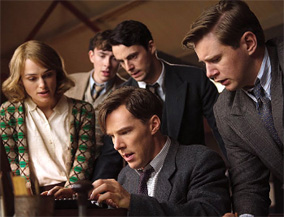|
|
They Shoot Oscar Prognosticators, Don’t They?The Toronto Film Festival—Part III: The Imitation Game Jumps Out AheadBy J. Don BirnamSeptember 22, 2014
Cumberbatch is supported by a talented cast that holds its own well despite being overshadowed by the lead character. Keira Knightley, in her second impressive role this year after Begin Again, plays the lone female amongst the group of cryptographers trying to crack the Enigma machine during World War II. Long gone are Keira’s pouty faces and mopey eyes. She plays a much more nuanced character - the rock that keeps Turing in place at his most desperate, and inspires him. Indeed, she plays a pivotal role in his life, and Knightley does not disappoint. Finally, Matthew Goode plays Turing’s nemesis-turned-ally, and provides an intellectual counterbalance to Turing’s genius and imperviousness. Also strong are most technical aspects of the war. The music, by Alexander Desplat - long overdue an Oscar after receiving nominations for such films as The Queen, The Curious Case of Benjamin Button, and Zero Dark Thirty - is exquisite, and always strikes the right chord scene-to-scene. The film also uses stylized cinematography in the few “live” war scenes it portrays - a dark, moody and vaporous lighting that respectfully conveys the horrors and devastation of the war, and that separates the shoots from the rest of the action. The director also used an off-hue for the flashbacks of Turing’s childhood, a more pale yellow/green tone that also serves the movie well and helps the viewer along subtly. And then, of course, we have the director himself, the acclaimed Morten Tyldum. Oh wait, no one has ever heard of him. Well, like Michel Hazanavicius (the Artist) before him, this name is bound to become a household utterance amongst Oscar watchers. He’s Norwegian, and this is only his fourth feature film. I honestly had not heard of the other three. But that probably means that he has as good a chance as any with the Academy, which has shown a penchant time and time again to reward lesser known directors over more acclaimed artists.
|

|
|
|

|
Saturday, April 20, 2024
© 2024 Box Office Prophets, a division of One Of Us, Inc.


